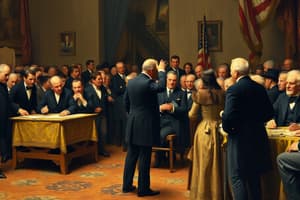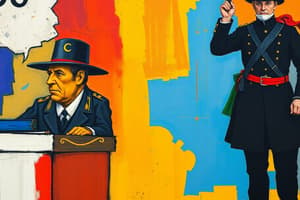Podcast
Questions and Answers
What was the main objective of John Brown during the Harper's Ferry Raid?
What was the main objective of John Brown during the Harper's Ferry Raid?
- To establish a network for escaped slaves and incite a slave uprising (correct)
- To form an alliance with pro-slavery advocates
- To negotiate the terms of emancipation with the federal government
- To conduct a peaceful protest against slavery in Virginia
How did John Brown's actions during his raid affect perceptions of him posthumously?
How did John Brown's actions during his raid affect perceptions of him posthumously?
- He was forgotten and had no significant legacy
- He was praised for his negotiation skills
- He was considered a hero exclusively by pro-slavery forces
- He was viewed as a martyr by abolitionists and a terrorist by pro-slavery advocates (correct)
What was the immediate outcome of the Harper's Ferry Raid for John Brown and his supporters?
What was the immediate outcome of the Harper's Ferry Raid for John Brown and his supporters?
- They escaped to Canada and continued their work against slavery
- They captured the armory and held it for several days
- They successfully established a free state in Virginia
- They were quickly overwhelmed by U.S. Marines and Brown was captured (correct)
What was a key belief held by John Brown regarding the end of slavery?
What was a key belief held by John Brown regarding the end of slavery?
What was one of the significant impacts of John Brown's raid on Harper's Ferry?
What was one of the significant impacts of John Brown's raid on Harper's Ferry?
What was a significant outcome of the Charleston Convention in April 1860?
What was a significant outcome of the Charleston Convention in April 1860?
Which candidate was nominated by the Southern Democrats after their split from the Democratic Party in 1860?
Which candidate was nominated by the Southern Democrats after their split from the Democratic Party in 1860?
What was a key characteristic of Abraham Lincoln's campaign strategy in the 1860 election?
What was a key characteristic of Abraham Lincoln's campaign strategy in the 1860 election?
What was the overall electoral outcome for Lincoln in the Election of 1860?
What was the overall electoral outcome for Lincoln in the Election of 1860?
What was the primary focus of the Constitutional Union Party led by John Bell?
What was the primary focus of the Constitutional Union Party led by John Bell?
Which event marked John Brown's militant response to pro-slavery violence during the Kansas-Nebraska period?
Which event marked John Brown's militant response to pro-slavery violence during the Kansas-Nebraska period?
What overarching theme was promoted by the Republican Party during Lincoln's campaign?
What overarching theme was promoted by the Republican Party during Lincoln's campaign?
What perception did Lincoln's victory in the 1860 election create among Southern states?
What perception did Lincoln's victory in the 1860 election create among Southern states?
Flashcards
Election of 1860
Election of 1860
The US presidential election held in 1860, resulting in Abraham Lincoln's victory and ultimately contributing to the start of the Civil War.
Republican Party's Strategy
Republican Party's Strategy
The Republican Party, under Lincoln, focused on restricting slavery's expansion; emphasizing their platform on free homesteads, tariffs, and internal improvements during the campaign.
Democratic Party Split
Democratic Party Split
The Democratic Party fractured into Northern and Southern factions over diverging views on slavery, ultimately nominating two different candidates.
Abraham Lincoln's Nomination
Abraham Lincoln's Nomination
Signup and view all the flashcards
Sectional Division
Sectional Division
Signup and view all the flashcards
John Brown
John Brown
Signup and view all the flashcards
Popular Sovereignty
Popular Sovereignty
Signup and view all the flashcards
Pottawatomie Massacre
Pottawatomie Massacre
Signup and view all the flashcards
Harper's Ferry Raid Cause
Harper's Ferry Raid Cause
Signup and view all the flashcards
Harper's Ferry Raid Execution
Harper's Ferry Raid Execution
Signup and view all the flashcards
John Brown's Philosophy
John Brown's Philosophy
Signup and view all the flashcards
Harper's Ferry Raid Impact
Harper's Ferry Raid Impact
Signup and view all the flashcards
John Brown's Legacy
John Brown's Legacy
Signup and view all the flashcards
Study Notes
The Election of 1860
- Deep sectional division over slavery fueled the election.
- Key parties:
- Democrats split: Northern Democrats (Douglas – popular sovereignty) and Southern Democrats (Breckinridge – pro-slavery).
- Republicans (Lincoln – opposed expansion of slavery).
- Constitutional Union Party (Bell – preservation of the Union)
- Democratic Conventions:
- Charleston Convention (April 1860): Failed to reach consensus on slavery, leading to a split.
- Baltimore Convention (June 1860): Douglas nominated for Northern Democrats. Breckinridge nominated by Southern Democrats.
- Republican National Convention:
- Lincoln (moderate) nominated in Chicago (May 1860).
- Campaign focused on restricting slavery's expansion, not complete abolition.
- Election Outcome:
- Lincoln won the Electoral College (180 votes) but less than 40% of the popular vote.
- Southern states reacted strongly. Breckinridge won slave states, Bell took border states, and Douglas won Missouri.
John Brown's Story
- Abolitionist Activist:
- Born in 1800, raised in Ohio. Influenced by father's abolitionist views.
- Witnessing slavery's brutality shaped his views.
- Bleeding Kansas and Violence:
- Kansas-Nebraska Act (1854) sparked violence.
- Pottawatomie Massacre (May 1856): Brown and his group retaliated for pro-slavery attacks on abolitionists.
- Harper's Ferry Raid (1859):
- Objective: Seize federal armory for slave uprising.
- Raid failed; led by Robert E. Lee.
- Brown was captured, tried, and hanged for treason.
- Impact and Legacy:
- Martyr to abolitionists, terrorist to pro-slavery supporters.
- Deepened the sectional conflict.
- His philosophy: slavery could only be ended by force.
Studying That Suits You
Use AI to generate personalized quizzes and flashcards to suit your learning preferences.




